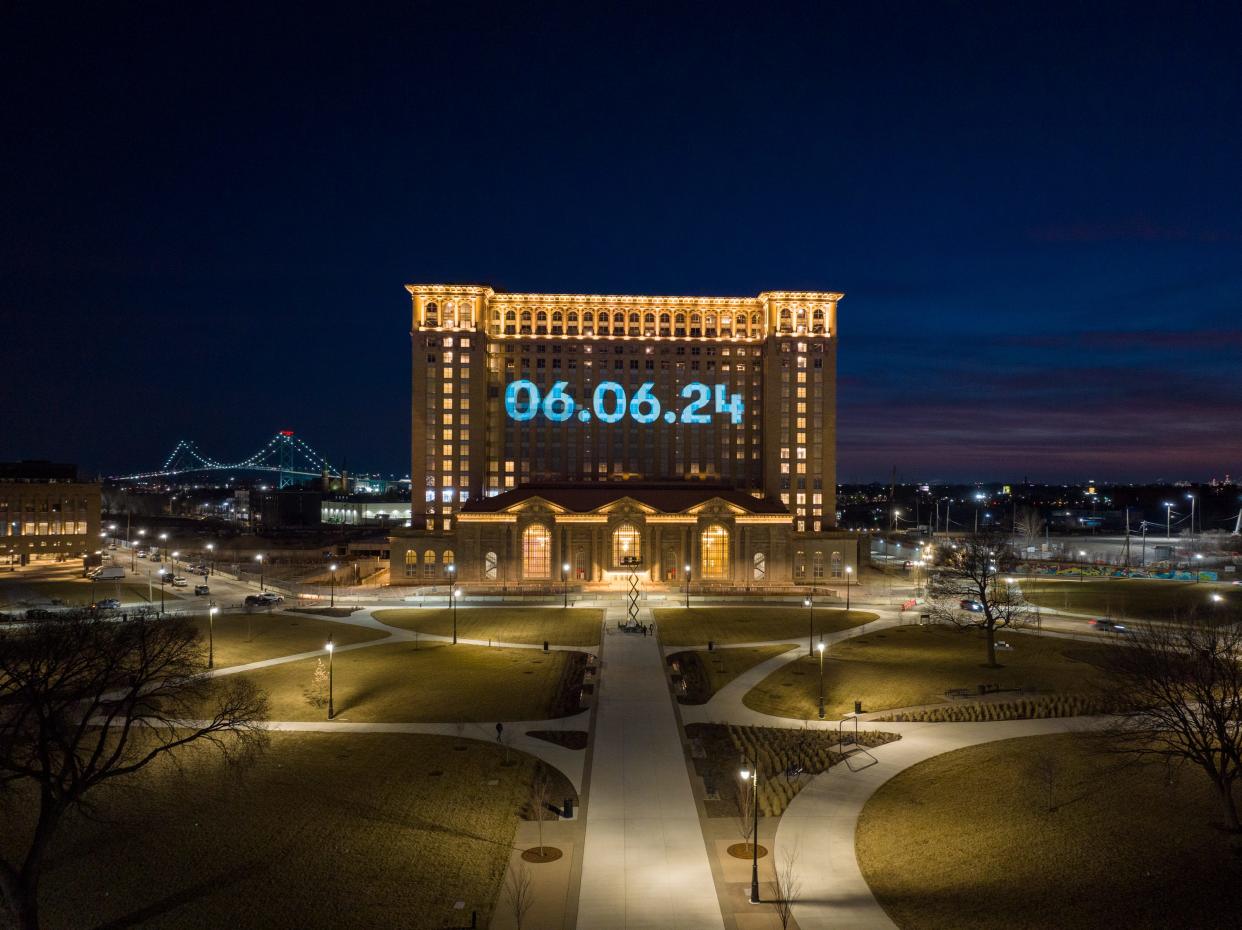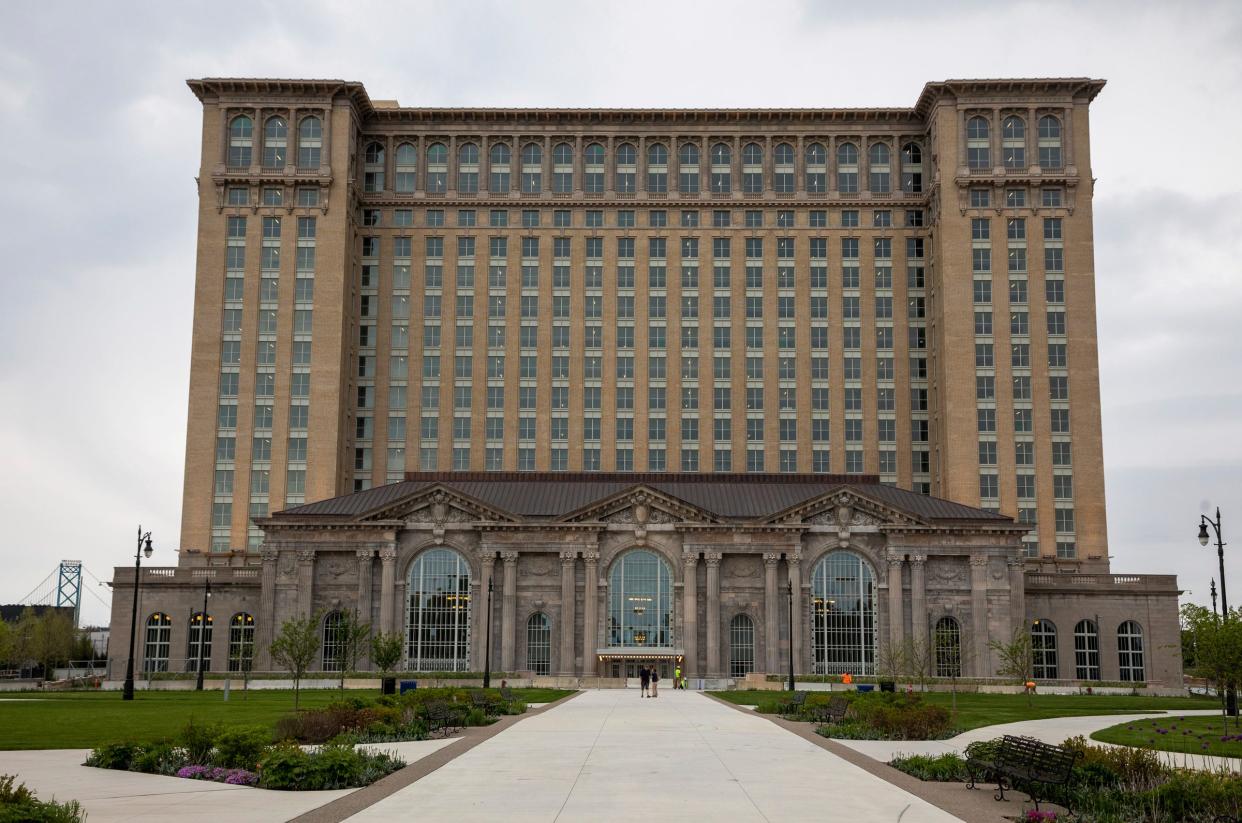Corktown property values and rents have surged, but business owners still awaiting boom
When the news broke in June 2018 that Ford Motor Co. was buying long-vacant Michigan Central Station and redeveloping it as the centerpiece of a new and exciting Detroit mobility campus, it set off a gold rush in Corktown, the city's oldest neighborhood.
The value of commercial property essentially doubled overnight, according to market insiders, and business owners were salivating at the future prospect of 5,000 new permanent workers eventually arriving with Ford's development.

Now just days away from the iconic station's grand reopening on June 6, Corktown has gained several new housing and hotel developments over the past six years and landlords are reportedly getting much higher rents. Yet businesses in the neighborhood are still waiting for the once-anticipated big boom to happen — and crossing their fingers that it eventually will.
Meanwhile, some owners of vacant buildings or undeveloped land near Michigan Central Station have been waiting to see who moves into the station and Ford's mobility campus before deciding their next moves.
The key questions are whether the pre-pandemic expectations for jobs at the new Corktown campus — 2,500 direct Ford jobs, plus 2,500 Ford partner or supplier jobs by the end of 2028 — will be met, and how often those people will be working in Corktown, visiting local businesses and restaurants and perhaps even taking up residence, versus working remote most days of the week.
“Will it be 5,000 jobs? I hope it still is," said Bob Roberts, president of the Corktown Business Association. "Will it be 5,000 jobs every day of the week? I don’t think so. Maybe we’ll get 5,000 jobs three days a week or something like that.
“And you can’t really blame Ford Motor Co. for that," he added. "Nobody had that vision or foresight that there was going to be a pandemic and the entire way that people lived and worked was going to change."
The owners of the six-story CPA Building on Michigan Avenue, directly across from Roosevelt Park and Michigan Central Station, have similar questions.

Sequoia Property Partners, an out-of-state firm, bought the long-empty white triangular building in 2014 and, after assembling parcels of adjoining land, began to market the 2-acre site as a good location for a potential future mixed-use development with commercial space, housing, perhaps even a hotel.
Yet the CPA Building remains empty and the site undeveloped.
"We’ve spoken to a lot of different groups. Tons of people are interested," Robert Zalkin, president of acquisitions and development at Sequoia Property Partners, said recently. "But in the same respect, people want to see what actually happens at the train station — when is it occupied, who’s occupying it.

"So we’re being patient and just waiting and seeing what happens," he continued. “The interest is there. But from a user standpoint, it’s hard to commit when you don’t know what’s actually happening at Ford.”
Open storefronts, high rents
Roberts, the Corktown Business Association president, also is co-owner of McShane's Irish Pub on Michigan Avenue, located across from the former site of Tiger Stadium. The site now is home to a youth baseball field and hundreds of new market-rate apartments and townhomes.

While Corktown is still a thriving neighborhood, Roberts said there are vacant storefronts scattered throughout the area. He attributes the situation in part to some former tenants, such as Michigan & Trumbull pizzeria, getting squeezed out by higher rents, as well as to Corktown landlords holding out in hopes of filling their spaces with big-dollar tenants in the future. (Michigan & Trumbull relocated to a site near New Center.)
“We’ve got, unfortunately, quite a bit of open storefronts, and I think that it is based on the fact that rents are so high," Roberts said.

McShane's this year experienced a 30% rent increase, he said. Although sales at the pub are higher than six years ago, Roberts said much of that increase came from having to raise menu prices because of inflation. The number of pub visitors also is up, he said, but more modestly so.
Land values double overnight

Ryan Cooley, owner of O'Connor Real Estate and Development, said the value of commercial real estate in Corktown more or less doubled once Ford announced its train station rehab and mobility campus project. Commercial values then leveled off and have remained about the same, he said.
"Land at the time was like $25 a square foot, and it jumped up to like $50 a square foot," Cooley said. "And we haven't seen anything sell above $50 a square foot in some time. And same thing with properties; it probably went from, for a finished building, $100 a square foot to $200 a square foot."
"But honestly since then, the pricing hasn’t changed," he said.
Prices have continued climbing, however, for residential sale prices and rents, Cooley said.
“We used to see that Woodbridge would be the exact same value for a house as Corktown, and now there’s definitely a bit of a bump when it comes to pricing in Corktown versus Woodbridge," he said.
Woodbridge is a neighborhood of predominately single-family homes that is north of Corktown and west of Midtown that also has seen a significant rise in property values.
Corktown resident Sheila Cockrel, a former Detroit City Council member, said it is still common for residents to get completely unsolicited offers from people wanting to buy their house.
“I have three sisters that all live in this neighborhood, and a nephew, and people will still just ring the doorbell and say, 'I’ll give you $350,000 cash, just let me buy the house,' " Cockrel said.

Some of the latest large housing developments in Corktown reserve a portion of their units at below-market rents for those with qualifying incomes, which is a standard concession in Detroit for projects making use of tax abatements or other subsidies.
Since 2019, there have been 478 new units of for-rent housing built in Corktown and 59 units of for-sale housing, according to city figures.
Still, there are reports of some renters getting squeezed out as the neighborhood becomes more upscale.
Roberts said that from chatting with customers at McShane's, he knows of about eight Corktown residents who in the past two years have been forced to move out of the neighborhood by rent increases.
“And I talk to people all the time who say, ‘Man, I’d love to live in Corktown — I just can’t afford it,’ ” he said.
One of the latest developments, conceived in the wake of Ford's 2018 announcement, is The Perennial Cortown, a newly constructed seven-story, 188-unit luxury apartment building at 1611 Michigan Ave., directly across from the former Tiger Stadium site.

The asking rents are at the high end of the market, starting at $1,650 per month for studio units, $1,850 for one bedrooms and the mid-$3,000s for two bedrooms with two baths. (10% of the building's apartments have significantly below-market rents for those with qualifying incomes.)
The same developers built a nearby sister property, the upscale 227-room Godfrey Hotel at 1401 Michigan Ave., that opened late last summer and features the new restaurant Hamilton's.
The Ford train station and mobility campus project were said to be major factors in spurring development of the Perennial and Godfrey.
What we know about Ford's campus
The grand reopening of Michigan Central Station is set for June 6. Ford has yet to specify how many of its own workers or those of its partners will be based there.

What is known is that Ford, at least initially, will occupy only a portion of the train station's tower that rises 15 floors above ground level. That will leave a significant number of floors for other occupants, such as a potential hotel on the top floors of the tower.
Ford's overall Detroit mobility campus also includes a building at 1907 Michigan Ave., The Factory, which the company has previously said is a base for over 250 members of its autonomous vehicle business and operations team. And there also is the old Book Depository building, located just next door to the rehabbed train station, which recently reopened as the Newlab at Michigan Central Building business incubator that is said to currently be home to 97 startups and businesses totaling nearly 600 jobs.
Still, there are various empty buildings and undeveloped properties scattered around the campus belonging to private owners that aren't Ford.
Greg Newman, of Farmington Hills-based Keystone Commercial Real Estate, said he suspects that many such owners have been waiting to see how vibrant the area becomes once Ford reopens the station before they decide on what to do with their properties.
“Once the station opens, I think you are going to see a lot more of that come alive — depending on what percent occupancy the train station is," Newman said.
One property of that type that recently changed hands is the abandoned Southwest Detroit Hospital building. The 1970s stainless-steel-clad building, 2401 20th St., closed in 1991 and has been vacant and derelict since 2007. After sitting vacant for years and falling prey to vandals, it finally sold in March for $6.5 million.
The seller was a limited liability company linked to prominent Detroit landlord Dennis Kefallinos. The ultimate buyer was the Detroit City FC minor league soccer club. Last week, the club announced its plans to raze the hollowed-out hospital and build a soccer stadium on the site in time for the 2027 season.
The stadium's arrival is expected to be a boon for Corktown businesses.
“Because of the office market being depressed, we’ve really turned back to where destination events drive a lot of traffic to the bars and restaurants," said Cooley of O'Connor Real Estate "To have (the soccer stadium) literally in the neighborhood is a huge thing in my opinion.”
More: Detroit City FC acquires abandoned hospital site for future soccer stadium
More: Michigan Central Station: How secret basement, flooding nightmare led to renovation delays
Contact JC Reindl: 313-378-5460 or jcreindl@freepress.com. Follow him on X @jcreindl
This article originally appeared on Detroit Free Press: Corktown land values and rents have surged, but boom yet to arrive
